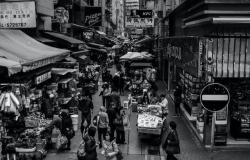Hong Kong: An Asian Autumn for Change?

The inception of Hong Kong protests is a timely reminder of the fact that a regime that isn’t truly representative of the aspirations of its people, will always result in disenchantment that will transform into a form of protest aimed at changing the status quo. At the same time, it shows the reluctance of the Chinese regime to provide any semblance of democracy to its territories lest it will have a domino effect on other regions, which do not exhibit cordial ties with Chinese leadership.
The current unrest appears to be a culmination of a protracted disillusionment and distrust with what is viewed as an “authoritarian” regime. Additionally, there are deep-rooted cultural and economic tensions, which seem to have manifested into a vociferous advocacy for democracy. The pro-democracy protests, better known as the “Umbrella Revolution” commenced with thousands of students boycotting classes and rallying outside government headquarters in downtown Hong Kong. This youth movement is demanding for the right to select the city’s top political executives in the 2017 elections through an open, free, and competitive process. They want to receive adequate representation and demand the resignation of the territory’s current chief executive Leung Chun-Ying, whose leadership has witnessed an exponential increase in income inequality and the continuing housing crisis.
This campaign magnifies the engrained friction between Hong Kong’s pro-democracy movements and mainland China’s Nationalist Agenda since Britain’s 1997 handover. The historical legacy of China-Hong Kong relations and the emergence of crony capitalism have inflamed socio-economic tensions, further widening the existing cultural split and classist disparity. As the wave of protests in Hong Kong have become more persistent and garnered widespread support, it raises important questions with respect to the future of the “one country two systems” concept particularly in the economic and regional importance Hong Kong holds for China in its quest for global supremacy.
Historical Overview of China’s Political Culture
To understand the context of the “Umbrella Revolution” its historical underpinnings must be considered. The political culture found in China and the complicated relationship it has with Hong Kong is significant to the rallying forms of social protest seen today.
The Chinese Communist Party (CCP) has ruled China, since it seized control in 1949 under Mao Zedong leadership after a 20-year civil war with Nationalist Chinese. The featured aspects of the Maoist era include China’s transition into industrialism, a strict-state controlled economy, socialist revolution, and export of Communist ideology. The role of ideology has been a striking feature of China’s political makeup. The ideas of Marxism-Leninism were used by political elites to justify monopolization of power and reached its heights during the Maoist “Great Leap Forward” and the Cultural Revolution. During this time, the government mobilized national unity through anti-Westernism and intensification of orthodox “redness.” In pursuance of its expansionist agenda and as a drive to make good for the historic humiliation China suffered from Britain and Japan, Mao began the process of restoring territorial claims over regions that were once part of the Qing and Ming dynasty. Ever since then, all CCP leaders have subscribed to the idea of a unified China with the objective of replicating its glory under the Qing dynasty. As part of the process, the Xinjiang (East Turkestan) province was secured through “peaceful liberation.” Furthermore, China has also made historic claims over Tibet and the South and East China Seas. It is pertinent to note that Hong Kong was also a part of the Qing dynasty and China regained control over territory after Britain’s handover in 1997.
In 1978, Deng Xiaoping assumed leadership signaling the transition of economic philosophy from a dogmatic approach in favor of a pragmatic approach. The central considerations of the Communist Party included: education and training, economic development through liberalization and trade, and technological transfer. However, nationalism has remained the hallmark of China’s foreign policy. Deng Xiaoping leadership ushered in prosperity, improved living standards, and initiated China’s low-value manufacturing industry. The late 80s to 1990s period of liberalization arguably signified an ideological thawing that triggered cyclical periods of government suppression and tightening of authoritative control. This is notably exemplified in China’s bloody purging tactics of Beijing’s Tiananmen Square protests in 1989.
China’s political history signifies that the state agenda is pegged on achieving global supremacy and restoring its lost glory through economic advancement and maintenance of territorial integrity. In this regard, maintaining economic stability and regime control over Hong Kong remains a paramount concern for the Chinese leadership. It must be noted that although China has used excessive force in the past to quell rebellion, it would be circumspect in invoking similar measures in a region of vital economic importance lest it will deteriorate the condition of the Chinese economy, which is already going through a phase of significant slowdown.
Demystifying the Socio-Economic Tensions
Seventeen years ago, Britain relinquished sovereignty of Hong Kong to China ending 155 years of colonial rule on July 1, 1997. This transition from imperialist to authoritarian rulers occurred without conferring with the local population. Some viewed this as a betrayal of the right of self-determination while others believe this was returning territory back to its rightful owners signaling the rise of Asia.
While China serves as a one-party state there are several fractions and constituencies that exist within its political structure. Hong Kong is regard as a ‘Special Administrative Region’ (SAR) meaning that it is considered semi-autonomous in terms of international presence, open media, immigration laws, currency, and legal and judicial structure. To this extent, Dr. Horace Chin Wan-kan, the academic leader of the “nativist movement” has rightly called Hong Kong “a city state.”
The Communist Party’s stronghold has placed many limitations on Hong Kong’s autonomy and many question whether it truly enjoys a “one country, two systems” equation. An example of this is how the citizens of Hong Kong do not hold the right to elect their own leadership. The system in place by the National People’s Congress (NPC) allows Beijing to screen and reject territory leader candidates. The NPC serves as China’s unicameral legislature. At face value the NPC holds high authority in its power to amend the constitution, enact laws, ratify treaties, create national economic plans, and elect or indict top political officials. However, at the root the NPC serves as a puppet to Party’s decisions and provide little more than a rubber stamp service. These candidates selected by NPC are made up primarily of elite business leaders from Mainland China, who are loyal to the Communist Party. The process is greatly based on political considerations not merit. The chief executive in Hong Kong exercises a predominate amount of authority leaving the legislature relatively powerless.
Honk Kong’s protest lineage is representative of China’s cyclical political probing into the territory. The second largest organized demonstration since Tiananmen occurred in Hong Kong in 2003, when 500,000 people protested over Beijing’s National Security Bill. The National Security Bill attempted to ban the organization of political parties and outlawed any form of treason, sedition, secession, and subversion against the National government in Hong Kong. Many viewed this as China’s attempt to interfere with Hong Kong affairs and reaffirm power and feared that if this Bill passed it would diminish their freedom to challenge the rule of law. In 2011, tens of thousands of protesters took to the streets against mainland property developer’s control over Hong Kong’s economy and politics. In 2012, 8000 protestors demanded the removal of national education system that was implemented to promote national communism in primary and secondary schools. This demonstration was sparked by “The China Model” booklet created by the government that promoted China’s single party decree and ignored its ruthless past.[1] Throughout the 21st century the tides of democracy have greatly encroached upon Hong Kong. Some view the rise of social protest in Hong Kong as a sign of change in government-citizen relations in China.
The “Umbrella Revolution” illustrates the growing demand for China to remake an Asian-style democracy that allows a scant middle ground. However, Mr. Xi has made it clear that Western-style democracy will not be exercised in China and Hong Kong’s leader will remain to be selected by a closed committee on instructions from Beijing. Economic and political frustration of the middle-class Hong Kong is evident and issues such as stagnant wage levels, increasing property costs, and business cronyism are being dragged into the spotlight. Hong Kong has significant levels of income inequality according to the Gini coefficient. Based on UN categorization of the Gini index values, 0.4-0.5 reflects relative income disparity and 0.5-0.6 > indicates major income disparity. Figure 1 provides the trend of income inequality in Hong Kong comparing a Gini coefficient based on original household income and based on post-tax post-social transfer of household income. This provides a comparative analysis of income disparity after tax and social welfare benefits have been provided. It is apparent that income tax and social transfer decrease or slowdown the level of income inequality. However, both trends reflect that income inequality is rising steadily suggesting that this is a long-term problem.
Fig.1
A pressing concern is Hong Kong’s real estate market. Most of the land is owned by the government and leasing favoritisms to high-end developers from China’s mainland are apparent. The increase of mainlander business developers purchasing Hong Kong real estate has driven up housing prices to levels paralleled to the Asian Financial Crisis of 1997. Even though Hong Kong predominantly enjoys a “laissez-faire” economic model there are exceptions known as “non-traded sector” and housing is one of them. The housing shortage in Hong Kong is caused in part by public housing policy. For example, the governments Home Ownership Scheme has strong restrictions on re-sale of public housing limiting its value and discouraging tenants from purchasing. Furthermore, there is a significant waiting period for accessing housing subsidy. Furthermore, there is the factor that supply has not met the growing demand greatly due to government intervention and ownership. The government has been sluggish in releasing land for new development and the process, in its current form, is replete with red-tapism. Aside from minimal public housing benefits, the government has provided limited social welfare services to Hong Kong citizens. The disenchantment of Hong Kong’s public with the Communist government is greatly rooted in their dissatisfaction with meager social benefits.
Moreover, an increase in crony capitalism and mistrust in government has risen among Hong Kong’s population. The fact that a third of China’s billionaires are party members exposes the apparent nexus between money and politics. The Economist recently ranked Hong Kong number 1 out of 23 economies in its “crony capitalism index” despite being one of the most free market economies. This rating magnifies how Hong Kong’s politics is dominated by a small group of aristocratic tycoons. Hong Kong’s chief executive Tung Chee Hwa (1997-2005), Donal Tsang (2005-2012), and current C.Y Leung, who is a private businessman and former real estate executive, have all been accused of scandal, deep Communist Party connections, and rife with cronyism.
The narrative unfolding in “Umbrella Revolution” further represents a divided history and ensuing cultural split. Hong Kong is a byproduct of colonialism and developed with Western inspiration of universal ideals and liberal modernity. Up until the last 17 years, Hong Kong’s development was greatly separate from China, which contributes to its distinct local culture.[2] This fragmented past has in part generated an “us” and “them” mentality. In 2011 the University of Hong Kong conducted an opinion poll that revealed citizens perceived themselves as “Hong Kongers” rather than Chinese citizens.
Tiananmen 2.0?
Although China would want to quell the uprising fearing that it might lead to a domino effect, where other sensitive Chinese regions such as Xinjiang will push for separatism and democracy, it would be circumspect in responding like it did during the Tiananmen massacre in 1989. The primary reason for this is because Hong Kong is the major source of foreign direct investment for China. As per the UNCTAD World Investment Report 2014, Hong Kong is the second largest source of FDI inflow and third largest source of FDI outflow in Asia. Moreover, a majority of direct investments in China go via Hong Kong.
Source: World Bank Fig.2
Source: World Bank Fig.3
Fig.2 & 3 clearly establish that despite being a small region, Hong Kong remains the hub of business activity and of paramount importance for China’s economic growth. Taken together, the total FDI inflows exceed that of United States, which is currently the top destination for foreign investment. Any violent crackdown reminiscent of the Tiananmen Square massacre may create a hostile investor sentiment causing significant losses to both Hong Kong and Mainland China. It may also be noted that Hong Kong by virtue of being an international financial center is also key to China’s agenda of strengthening the influence of Renminbi in the global financial sector with the ultimate objective of taking over as the reserve currency of the world. Additionally, Hong Kong also remains a destination through, which China introduces its products and services and invites technology and talent. Any inkling of a violent response to the peaceful protests will discredit the global stature Hong Kong enjoys and hurt China economically. However, looking at the deep long-term interests China has in the region coupled with the potential for a negative spillover effect the movement’s continuance may have elsewhere, a possibility of a brutal crackdown cannot be dismissed.
From Arab Spring to an Asian Autumn
The Arab spring may hold some valuable lessons for the youth protestors in Hong Kong. Mahmoud Salem’s advise to the Hong Kong protestors in his piece in the Foreign Policy magazine should be harkened. If there is anything to learn from the Arab Spring, it is that if an agitation is not sustained, the government will capitalize on the fleeting attention span to revert to status quo. The protestors will also be well advised to have realistic goals set in place along with the more ambitious goal of expecting democracy from the Chinese regime. Although, previous manifestations have been successful and the Chinese government has allowed a great deal of freedom to Hong Kong despite initial reluctance, the current claims threaten the very fabric and ideology of the Chinese State. Thus, It would be wrong for the protestors to think that they will generate similar results given the nature of national interest involved in this scenario. Given this context, the youth protestors must also have a detailed set of policy changes that would be needed to address the continuing disillusionment with the leadership, one which calls for greater regulation on crony capitalism and greater push for welfare schemes. A possible scenario that may emerge out of this logjam is that the current chief would be made to take the blame for the woes of the Hong Kong population and another screened candidate would take his post. Even, if such a situation emerges and notwithstanding the short-lived attention span of the public, the new leader must become more responsive to the tribulations and aspirations of his/her population lest we see another uprising, which may be more vociferous and totally spiral out of control.
The Authors are members of the Oval Observer Foundation. The views presented in this article do not reflect the views of the Foundation, its partners and affiliates.
Photo by KH Tan
[1] Lance Hoovestal. Globalization Contained: The Economic and Strategic Consequence of the Container.
[2] Joseph Dobbs. http://thediplomat.com/2014/09/hong-kong-and-china-one-country-two-histories/


